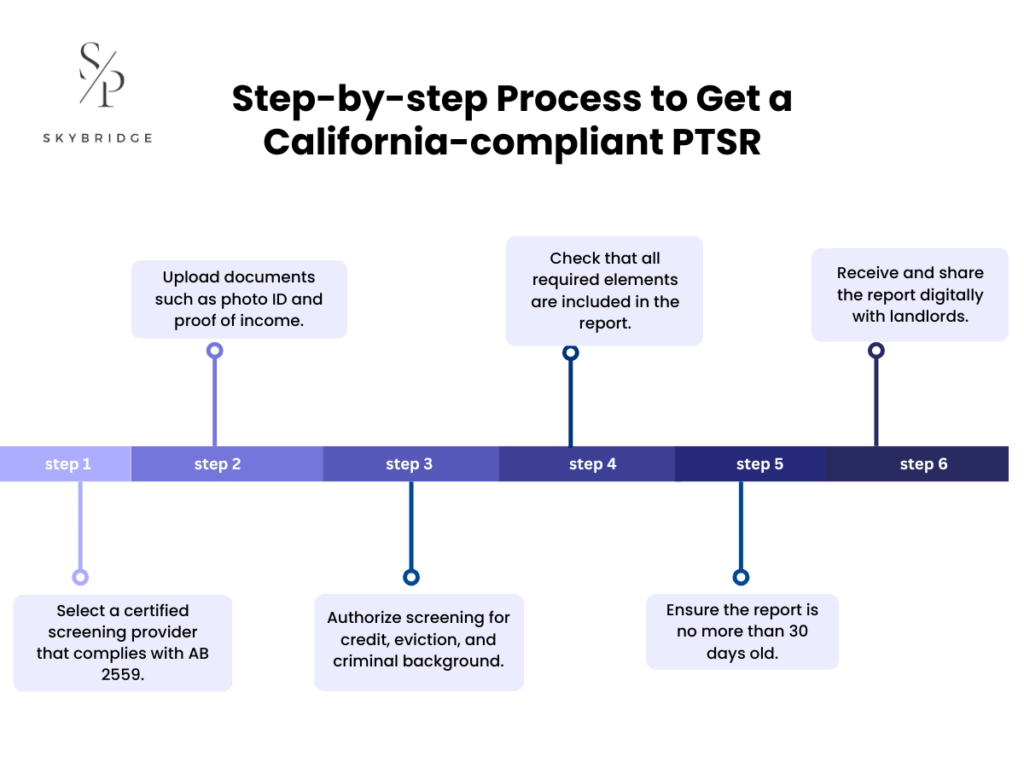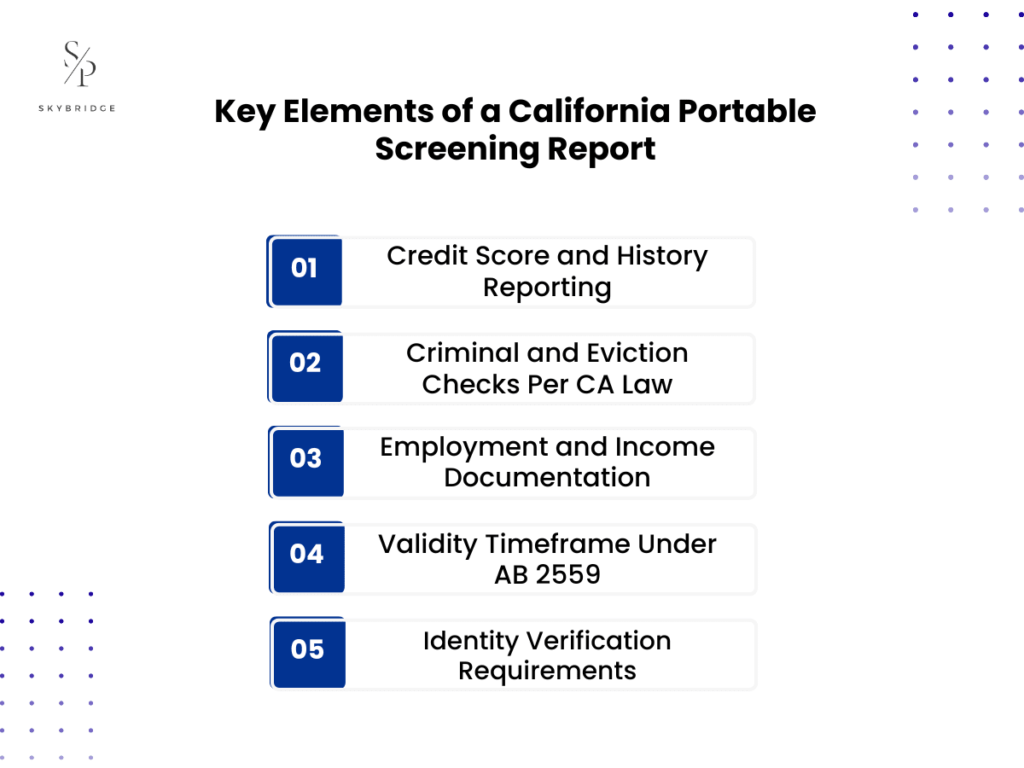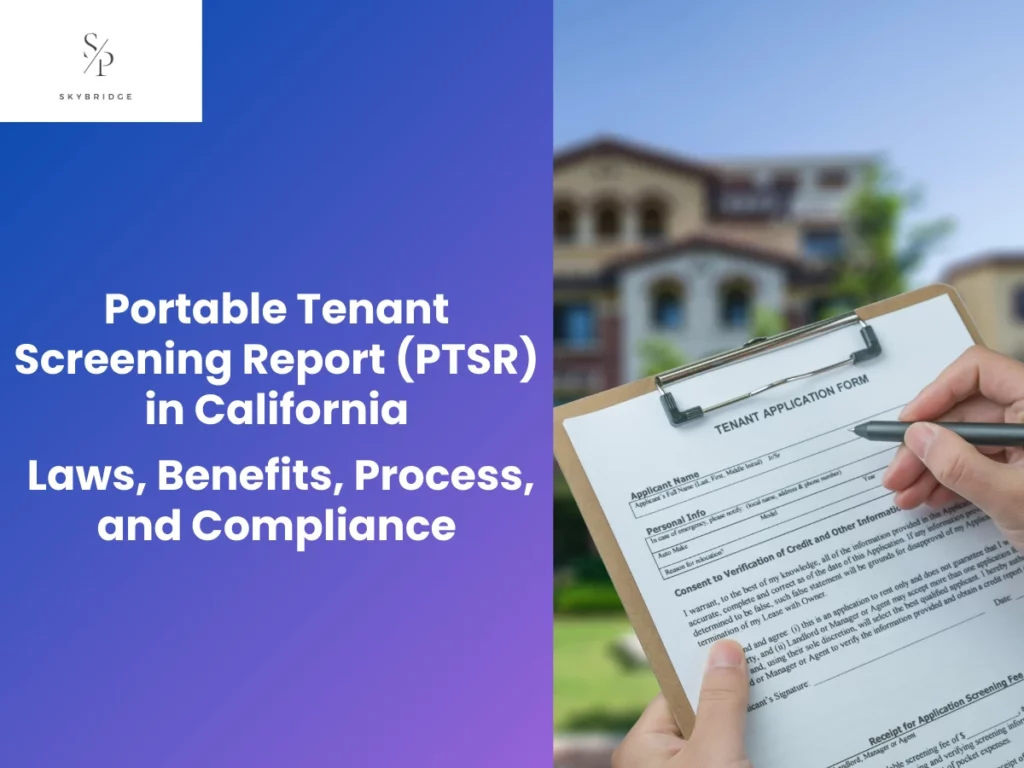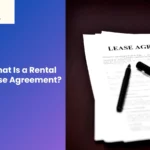In competitive rental markets across California, such as Los Angeles, Riverside, and Orange County, renters often apply to several properties at once. Each application typically requires separate screening reports, which leads to repeated fees, credit checks, and delays. This process can be time-consuming and financially draining for tenants trying to secure housing quickly.
To address these inefficiencies, California law allows renters to use a Portable Tenant Screening Report, or PTSR. This is a single, reusable tenant-initiated report that includes verified information such as credit history, eviction records, criminal background, income documentation, and identity verification. Certified tenant screening providers handle the screening and make the report securely shareable for up to 30 days.
By reusing one report across multiple applications, renters save time and money, while landlords receive complete and consistent screening data. Under Assembly Bill 2559, landlords are legally required to accept valid PTSRs that meet all compliance criteria.
What Is a Portable Tenant Screening Report?
A Portable Tenant Screening Report (PTSR) is a reusable screening document that a renter obtains to apply for multiple rental properties. Valid for 30 days, it allows tenants to submit a single, verified report instead of repeating the screening process with each application. This is especially useful in competitive rental markets where time and cost matter.
To qualify under California’s AB 2559, a valid PTSR must include a credit check, eviction and criminal history, income verification, and proof of identity. It must be prepared by a certified screening provider, remain unchanged throughout the 30-day window, and be accepted by landlords once verified. This makes the rental process faster for applicants and more efficient for property managers and landlords reviewing standardized, pre-verified information.
Why Is a Portable Tenant Screening Report Important?
A Portable Tenant Screening Report (PTSR) streamlines the rental process by reducing redundancy, saving money, and speeding up approval timelines. Instead of submitting a new screening report for every application, renters can reuse a single, verified document, helping them move faster in competitive markets. Landlords also benefit from receiving consistent, pre-vetted information, which helps them make quicker, more confident leasing decisions.
Key reasons why a PTSR is important:
- Saves money by eliminating repeated application fees
- Reduces credit impact from multiple hard inquiries
- Speeds up approvals with pre-verified tenant data
- Ensures legal alignment with California’s AB 2559
- Simplifies paperwork for both renters and landlords
- Improves decision quality with standardized screening info
- Supports transparency in application evaluations
How to Get a Portable Tenant Screening Report in California?
You can get a Portable Tenant Screening Report (PTSR) in California by using a certified screening provider that follows AB 2559 requirements. You will need to submit a valid photo ID, proof of income, and authorize credit, eviction, and background checks. Once completed, the provider issues a digital report valid for 30 days. The PTSR can then be shared with multiple landlords, as long as it includes all required components and remains unaltered.
Step-by-step Process to Get a California-compliant PTSR

To get a California-compliant Portable Tenant Screening Report (PTSR), renters must follow a verified process through a provider that meets AB 2559 requirements. The goal is to ensure the report contains all legally required data and can be reused across multiple applications. Accuracy and timing are critical, as the report is only valid for 30 days.
Steps to get a valid PTSR include:
- Select a certified screening provider that complies with AB 2559.
- Upload documents such as photo ID and proof of income.
- Authorize screening for credit, eviction, and criminal background.
- Check that all required elements are included in the report.
- Ensure the report is no more than 30 days old.
- Receive and share the report digitally with landlords.
Valid Providers and Compliance Checks
Only reports from certified screening providers are legally accepted under California’s AB 2559. To ensure compliance, tenants must verify that the provider includes all required data points and follows secure reporting standards. Using an unapproved or incomplete report may result in rejection by landlords.
Key compliance checks for a valid PTSR:
- Provider must offer credit, eviction, and criminal background checks.
- Report must include income verification and a government-issued ID.
- All information must be current and issued within the last 30 days.
- Report must remain unaltered from the time it is generated.
- Provider must follow secure data handling and identity verification procedures.
- PTSR must be made available digitally for easy landlord access.
How to Share a PTSR with Multiple Landlords?
You can share a Portable Tenant Screening Report (PTSR) with multiple landlords by using the secure digital tools provided by your certified screening provider. As long as the report is valid under California’s AB 2559, it can be sent to any property manager within the 30-day window.
Common ways to share a PTSR with landlords include:
- Secure link generated directly by the provider.
- Downloadable PDF that can be emailed or uploaded to applications.
- Provider’s landlord portal, where access is given upon tenant approval.
- Confirmation logs or receipts that track when and where the report was shared.
Tenants should always ensure the report is current, unaltered, and complete when sending it to multiple property managers.
Key Elements of a California Portable Screening Report

A California Portable Tenant Screening Report (PTSR) must include a current credit report with score, criminal background check, eviction history, proof of income and employment, and a government-issued photo ID. Under AB 2559, these elements must be verified by a certified provider, and the report must be less than 30 days old for landlords to accept it.
Credit Score and History Reporting
A California Portable Tenant Screening Report (PTSR) must include a current credit score and a detailed credit history, as required by AB 2559. This section usually shows the scoring model used (FICO or VantageScore), account activity, payment history, credit utilization, and any outstanding debts. Landlords depend on this data to measure a tenant’s ability to pay rent reliably and on time. Renters can obtain a PTSR through a Consumer Reporting Agency (CRA) that follows the Fair Credit Reporting Act (FCRA), ensuring the report is accurate, compliant, and issued within the last 30 days.
Criminal and Eviction Checks Per CA Law
Screening for criminal and eviction history is required for a California Portable Tenant Screening Report (PTSR) under AB 2559. A criminal history check may show felony or misdemeanor convictions, active warrants, court filings, and alerts from databases like sex offender registries or FBI reports. Because California limits how this data can be used, landlords must follow the Fair Credit Reporting Act (FCRA), Fair Housing Act (FHA), HUD guidelines, and Fair Chance Housing rules. Eviction history often reveals missed rent payments, unlawful detainer cases, court rulings for possession, and eviction orders.
Employment and Income Documentation
Verification of employment and income is a required part of a California Portable Tenant Screening Report (PTSR) to confirm a renter’s ability to pay rent. Acceptable documents include recent pay stubs, tax returns, bank statements, or official employment letters. Providers check these records for accuracy and consistency before including them in the report. Under AB 2559, this financial data must be current and properly verified to ensure legal compliance. For landlords, this information demonstrates stable earnings, while tenants benefit from having standardized proof of financial reliability.
Validity Timeframe Under AB 2559
The validity of a Portable Tenant Screening Report (PTSR) is limited to 30 days. This means the report must show an issue date within the last 30 days when given to a landlord, or it can be declined even if all components are present. The 30-day rule ensures that sensitive information, such as credit status, income records, and background checks, remains accurate and current. Renters planning to apply for several properties should monitor the report date closely and request a new PTSR before the validity period expires to avoid delays.
Identity Verification Requirements
To be valid under California’s AB 2559, every Portable Tenant Screening Report (PTSR) must include proof of the applicant’s identity. This step helps prevent fraud, ensures accuracy in screening results, and builds trust between tenants and landlords. Reports without proper identity verification may be rejected.
Acceptable forms of identity verification include:
- Government-issued photo ID (driver’s license, passport, or state ID)
- Social Security number confirmation or match
- Proof of current address (utility bill, lease, or bank statement)
Certified screening providers cross-check these details before issuing the PTSR to confirm the applicant’s identity.
Benefits of Portable Screening for California Renters and Landlords
A Portable Tenant Screening Report (PTSR) benefits renters by lowering application costs and landlords by providing reliable, standardized screening information. Because the same report can be reused for 30 days under AB 2559, tenants avoid paying repeated fees, and landlords receive complete, verified data without delays. This creates a faster, more transparent process for both sides.
Key benefits of PTSRs include:
- Lower costs for tenants by avoiding repeated application fees
- Reduced credit impact from multiple inquiries
- Faster approvals with ready-to-use screening data
- Simplified paperwork across multiple rental applications
- Legal compliance with AB 2559 requirements
- Standardized, verified data for landlord decision-making
- Improved transparency in tenant screening
Challenges of Using Portable Tenant Screening Reports
While Portable Tenant Screening Reports (PTSRs) bring convenience and savings, they also involve challenges like outdated data, risk of fraud, and uneven acceptance among landlords despite California’s AB 2559 requirements. These issues can limit the effectiveness of the report and create delays for renters.
Common challenges of PTSRs include:
- Outdated data when the report is older than 30 days
- Fraud risks from altered or falsified information
- Limited acceptance by landlords unfamiliar with AB 2559
- Inconsistent provider quality leading to incomplete reports
- Potential delays if landlords request additional verification
To reduce problems, renters should use certified providers, and landlords should follow compliance guidelines.
Understanding AB 2559: California’s Reusable Tenant Screening Law
California Assembly Bill 2559 (AB 2559) requires landlords to accept a valid Portable Tenant Screening Report (PTSR) that is no more than 30 days old and prepared by a certified provider. The law specifies that a compliant tenant screening report must include credit history, eviction and criminal checks, income verification, and identity documentation. By standardizing these requirements, AB 2559 reduces repeated application fees, improves screening transparency, and ensures that both tenants and landlords work with accurate and consistent information.
What Renters Must Include in a Valid PTSR?
Renters must include a credit report, criminal background check, eviction history, income and employment verification, and a government-issued photo ID for a Portable Tenant Screening Report (PTSR) to be valid in California. Under AB 2559, these five elements must be verified by a certified screening provider, and the report must be no more than 30 days old when submitted to a landlord. If any of these components are missing, outdated, or unverified, the landlord is not legally required to accept the PTSR as part of the rental application process.
Do Landlords Have to Accept Portable Reports?
Yes, landlords in California are required to accept a Portable Tenant Screening Report (PTSR) if it meets the compliance standards of AB 2559. To be valid, the report must be issued by a certified screening provider, include credit, eviction, criminal, income, and identity verification, and be dated within the last 30 days. If a landlord refuses to accept a compliant report, they must provide a written explanation or have a legal exemption, such as subsidized housing requirements. This ensures fair, transparent, and standardized rental screening practices across the state.
Rights and Protections for California Tenants
Under AB 2559, California tenants have important rights that make the rental application process more affordable and transparent. A valid Portable Tenant Screening Report (PTSR) can be reused across multiple applications within 30 days, and landlords must accept it unless exempt by law.
Key tenant rights include:
- Reuse of one PTSR for multiple rental applications
- Protection from repeated screening fees
- Written disclosure if a landlord rejects a compliant report
- Transparency in how screening information is used
- Broader protections under FCRA, FHA, HUD guidelines, and Fair Chance Housing rules
How Can a Property Management Company Help with Portable Tenant Screening?
Property management companies help ensure that Portable Tenant Screening Reports (PTSRs) are handled correctly under California’s AB 2559. They review tenant-submitted reports for accuracy, confirm that all required components are present, and verify that the report falls within the 30-day validity window. This process reduces errors, prevents delays, and ensures landlords receive complete and reliable information.In addition to compliance checks, property managers simplify workflows across multiple rental units. They can securely manage and share reports, educate tenants about valid providers, and guide landlords on compliance requirements. By standardizing screening practices and maintaining secure processes, a property management company helps create faster approvals, lower costs, and a more efficient rental experience for both tenants and landlords.







